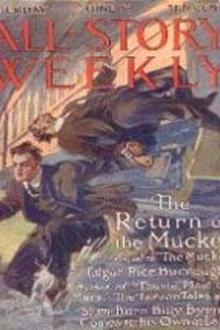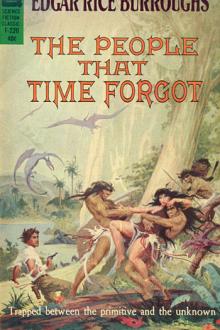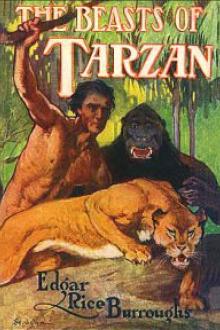The Return of the Mucker by Edgar Rice Burroughs (top inspirational books TXT) 📕

- Author: Edgar Rice Burroughs
- Performer: -
Book online «The Return of the Mucker by Edgar Rice Burroughs (top inspirational books TXT) 📕». Author Edgar Rice Burroughs
“Where is he?” someone asked. They were gathered in a little cluster now about Billy Byrne and Shorter.
“I saw him duck behind the office building,” said Eddie.
“Come on,” said another. “We’ll get him.”
“Someone get a rope.” The men spoke in low, ordinary tones—they appeared unexcited. Determination was the most apparent characteristic of the group. One of them ran back toward the bunkhouse for his rope. The others walked slowly in the direction of the rear of the office building. Grayson was not there. The search proceeded. The Americans were in advance. The Mexicans kept in a group by themselves a little in rear of the others—it was not their trouble. If the gringos wanted to lynch another gringo, well and good—that was the gringos’ business. They would keep out of it, and they did.
Down past the bunkhouse and the cookhouse to the stables the searchers made their way. Grayson could not be found. In the stables one of the men made a discovery—the foreman’s saddle had vanished. Out in the corrals they went. One of the men laughed—the bars were down and the saddle horses gone. Eddie Shorter presently pointed out across the pasture and the river to the skyline of the low bluffs beyond. The others looked. A horseman was just visible urging his mount upward to the crest, the two stood in silhouette against the morning sky pink with the new sun.
“That’s him,” said Eddie.
“Let him go,” said Billy Byrne. “He won’t never come back and he ain’t worth chasin’. Not while we got Miss Barbara to look after. My horse is down there with yours. I’m goin’ down to get him. Will you come, Shorter? I may need help—I ain’t much with a rope yet.”
He started off without waiting for a reply, and all the Americans followed. Together they circled the horses and drove them back to the corral. When Billy had saddled and mounted he saw that the others had done likewise.
“We’re goin’ with you,” said one of the men. “Miss Barbara b’longs to us.”
Billy nodded and moved off in the direction of the ranchhouse. Here he dismounted and with Eddie Shorter and Mr. Harding commenced circling the house in search of some manner of clue to the direction taken by the abductors. It was not long before they came upon the spot where the Indians’ horses had stood the night before. From there the trail led plainly down toward the river. In a moment ten Americans were following it, after Mr. Harding had supplied Billy Byrne with a carbine, another sixshooter, and ammunition.
Through the river and the cut in the barbed-wire fence, then up the face of the bluff and out across the low mesa beyond the trail led. For a mile it was distinct, and then disappeared as though the riders had separated.
“Well,” said Billy, as the others drew around him for consultation, “they’d be goin’ to the hills there. They was Pimans—Esteban’s tribe. They got her up there in the hills somewheres. Let’s split up an’ search the hills for her. Whoever comes on ‘em first’ll have to do some shootin’ and the rest of us can close in an’ help. We can go in pairs—then if one’s killed the other can ride out an’ lead the way back to where it happened.”
The men seemed satisfied with the plan and broke up into parties of two. Eddie Shorter paired off with Billy Byrne.
“Spread out,” said the latter to his companions. “Eddie an’ I’ll ride straight ahead—the rest of you can fan out a few miles on either side of us. S’long an’ good luck,” and he started off toward the hills, Eddie Shorter at his side.
Back at the ranch the Mexican vaqueros lounged about, grumbling. With no foreman there was nothing to do except talk about their troubles. They had not been paid since the looting of the bank at Cuivaca, for Mr. Harding had been unable to get any silver from elsewhere until a few days since. He now had assurances that it was on the way to him; but whether or not it would reach El Orobo was a question.
“Why should we stay here when we are not paid?” asked one of them.
“Yes, why?” chorused several others.
“There is nothing to do here,” said another. “We will go to Cuivaca. I, for one, am tired of working for the gringos.”
This met with the unqualified approval of all, and a few moments later the men had saddled their ponies and were galloping away in the direction of sun-baked Cuivaca. They sang now, and were happy, for they were as little boys playing hooky from school—not bad men; but rather irresponsible children.
Once in Cuivaca they swooped down upon the drinking-place, where, with what little money a few of them had left they proceeded to get drunk.
Later in the day an old, dried-up Indian entered. He was hot and dusty from a long ride.
“Hey, Jose!” cried one of the vaqueros from El Orobo Rancho; “you old rascal, what are you doing here?”
Jose looked around upon them. He knew them all—they represented the Mexican contingent of the riders of El Orobo. Jose wondered what they were all doing here in Cuivaca at one time. Even upon a pay day it never had been the rule of El Orobo to allow more than four men at a time to come to town.
“Oh, Jose come to buy coffee and tobacco,” he replied. He looked about searchingly. “Where are the others?” he asked, “—the gringos?”
“They have ridden after Esteban,” explained one of the vaqueros. “He has run off with Senorita Harding.”
Jose raised his eyebrows as though this was all news.
“And Senor Grayson has gone with them?” he asked. “He was very fond of the senorita.”
“Senor Grayson has run away,” went on the other speaker. “The other gringos wished to hang him, for it is said he has bribed Esteban to do this thing.”
Again Jose raised his eyebrows. “Impossible!” he ejaculated. “And who then guards the ranch?” he asked presently.
“Senor Harding, two Mexican house servants, and a Chinaman,” and the vaquero laughed.
“I must be going,” Jose announced after a moment. “It is a long ride for an old man from my poor home to Cuivaca, and back again.”
The vaqueros were paying no further attention to him, and the Indian passed out and sought his pony; but when he had mounted and ridden from town he took a strange direction for one whose path lies to the east, since he turned his pony’s head toward the northwest.
Jose had ridden far that day, since Billy had left his humble hut. He had gone to the west to the little rancho of one of Pesita’s adherents who had dispatched a boy to carry word to the bandit that his Captain Byrne had escaped the Villistas, and then Jose had ridden into Cuivaca by a circuitous route which brought him up from the east side of the town.
Now he was riding once again for Pesita; but this time he would bear the information himself. He found the chief in camp and after begging tobacco and a cigarette paper the Indian finally reached the purpose of his visit.
“Jose has just come from Cuivaca,” he said, “and there he drank with all the Mexican vaqueros of El Orobo Rancho— ALL, my general, you understand. It seems that Esteban has carried off the beautiful senorita of El Orobo Rancho, and the vaqueros tell Jose that ALL the American vaqueros have ridden in search of her—ALL, my general, you understand. In such times of danger it is odd that the gringos should leave El Orobo thus unguarded. Only the rich Senor Harding, two house servants, and a Chinaman remain.”
A man lay stretched upon his blankets in a tent next to that occupied by Pesita. At the sound of the speaker’s voice, low though it was, he raised his head and listened. He heard every word, and a scowl settled upon his brow. Barbara stolen! Mr Harding practically alone upon the ranch! And Pesita in possession of this information!
Bridge rose to his feet. He buckled his cartridge belt about his waist and picked up his carbine, then he crawled under the rear wall of his tent and walked slowly off in the direction of the picket line where the horses were tethered.
“Ah, Senor Bridge,” said a pleasant voice in his ear; “where to?”
Bridge turned quickly to look into the smiling, evil face of Rozales.
“Oh,” he replied, “I’m going out to see if I can’t find some shooting. It’s awfully dull sitting around here doing nothing.”
“Si, senor,” agreed Rozales; “I, too, find it so. Let us go together—I know where the shooting is best.”
“I don’t doubt it,” thought Bridge; “probably in the back;” but aloud he said: “Certainly, that will be fine,” for he guessed that Rozales had been set to watch his movements and prevent his escape, and, perchance, to be the sole witness of some unhappy event which should carry Senor Bridge to the arms of his fathers.
Rozales called a soldier to saddle and bridle their horses and shortly after the two were riding abreast down the trail out of the hills. Where it was necessary that they ride in single file Bridge was careful to see that Rozales rode ahead, and the Mexican graciously permitted the American to fall behind.
If he was inspired by any other motive than simple espionage he was evidently content to bide his time until chance gave him the opening he desired, and it was equally evident that he felt as safe in front of the American as behind him.
At a point where a ravine down which they had ridden debauched upon a mesa Rozales suggested that they ride to the north, which was not at all the direction in which Bridge intended going. The American demurred.
“But there is no shooting down in the valley,” urged Rozales.
“I think there will be,” was Bridge’s enigmatical reply, and then, with a sudden exclamation of surprise he pointed over Rozales’ shoulder. “What’s that?” he cried in a voice tense with excitement.
The Mexican turned his head quickly in the direction Bridge’s index finger indicated.
“I see nothing,” said Rozales, after a moment.
“You do now, though,” replied Bridge, and as the Mexican’s eyes returned in the direction of his companion he was forced to admit that he did see something—the dismal, hollow eye of a sixshooter looking him straight in the face.
“Senor Bridge!” exclaimed Rozales. “What are you doing? What do you mean?”
“I mean,” said Bridge, “that if you are at all solicitous of your health you’ll climb down off that pony, not forgetting to keep your hands above your head when you reach the ground. Now climb!”
Rozales dismounted.
“Turn your back toward me,” commanded the American, and when the other had obeyed him, Bridge dismounted and removed the man’s weapons from his belt. “Now you may go, Rozales,” he said, “and should you ever have an American in your power again remember that I spared your life when I might easily have taken it—when it would have been infinitely safer for me to have done it.”
The Mexican made no reply, but the black scowl that clouded his face boded ill for the next gringo who should be
so unfortunate as to fall into his hands. Slowly he wheeled about and started back up the trail in the direction of the Pesita camp.
“I’ll be halfway to El Orobo,” thought Bridge, “before he gets a chance to tell Pesita what happened to him,” and then he remounted and rode on down into the valley, leading Rozales’ horse behind





Comments (0)